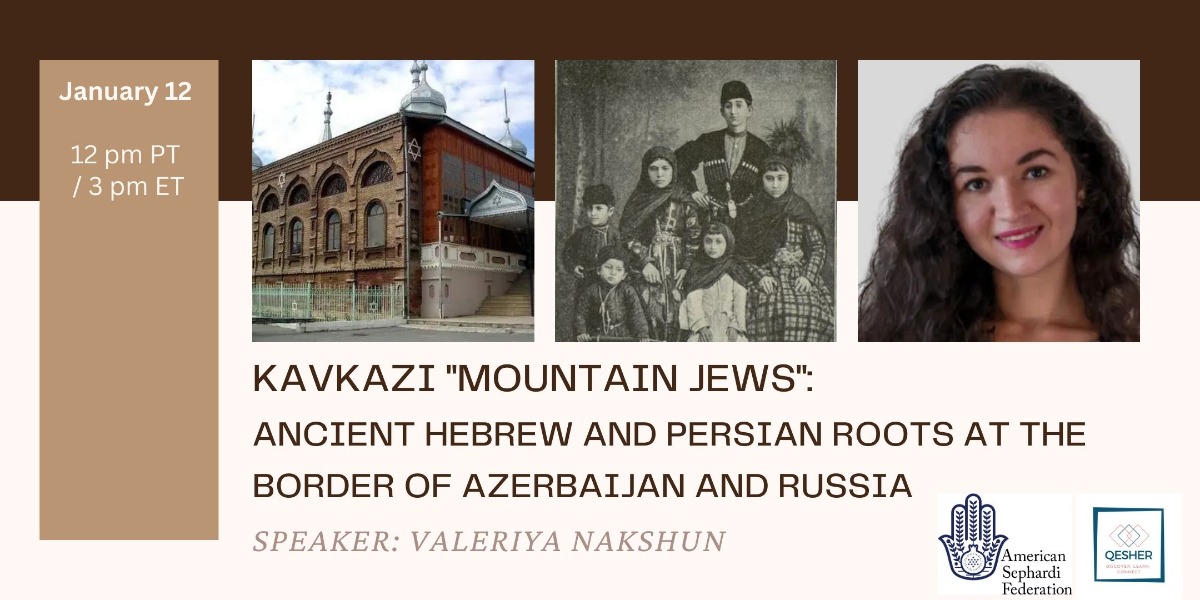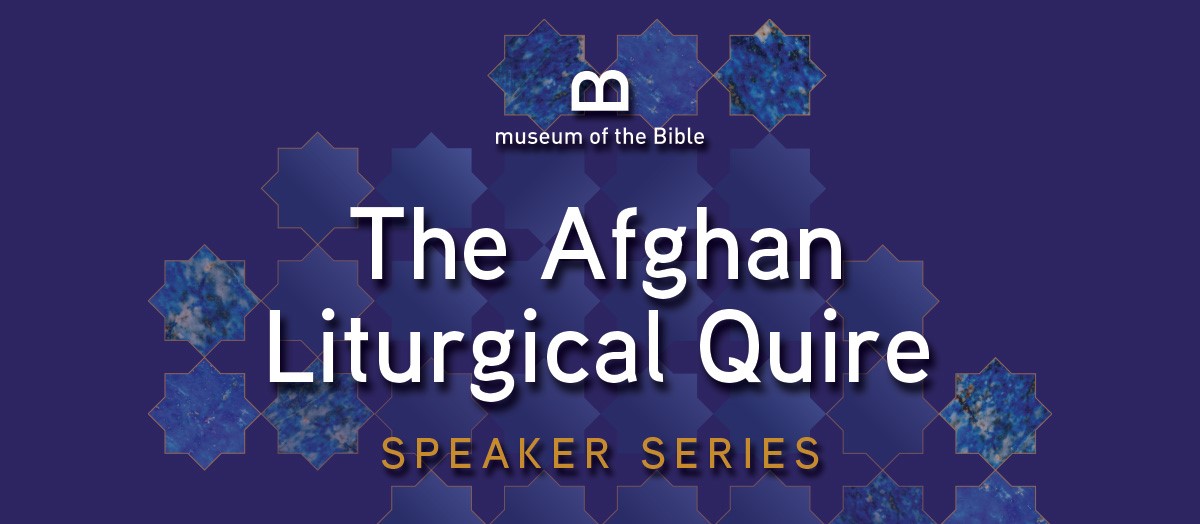In Memory of Morton (Mort) Abramowitz, Z”L, a celebrated American diplomat who served as Ambassador to Thailand and Turkey, and who used his position to protect the persecuted, from Bosnia-Herzegovina and Kosovo to Kurdistan, and Cambodia and Thailand. Abromowitz passed away in Washington, D.C., on 29 November at the age of 91.
Click here to dedicate a future issue in honor or memory of a loved one
Subscribe ◊ Upcoming Events ◊ ASF Sephardi Shop ◊ Donate ◊ Sephardi Ideas Monthly ◊ ASF IJE ◊ ASF Sephardi House ◊ Archive
The Sephardi World Weekly is made possible by Daniel Yifrach, Rachel Sally, Professor Rifka Cook, Maria Gabriela Borrego Medina, Rachel Amar, Deborah Arellano, & ASF VP Gwen Zuares!
Don’t miss the latest Sephardi Ideas Monthly: “L’Moledet Shuvi Roni: Asher Mizrahi’s Biblical-Zionist Romance”
“Sephardim, Mizrachim in NY more conservative, less likely to intermarry than peers, per UJA study”
By Vita Fellig, JNS
Rina Kattan Cohen (Manager, Community Organizing & External Relations, UJA-Federation of New York), Ruben Shimonov (ASF’s National Director of Sephardi House & Education), Josh Benaim (Visionary Founder of ASF’s Sephardi House Fellowship), and Jason Guberman (Executive Director, American Sephardi Federation)
One of the stranger aspects of American Jewish institutional thinking has been the marginal attention that, until very recently, was paid to Greater Sephardi Jewish cultures that do an excellent job of preserving and transmitting Jewish life. The Nov. 7th “Sephardic and Mizrahi Symposium” at the UJA-Federation of New York headquarters in Manhattan was a significant step in the right direction for Jewish institutional leadership to learn from Sepharadim the secrets of Jewish unity and continuity.
The symposium’s centerpiece was the UJA’s 2023 “Community Study” noting how “Sephardic and Mizrahi New Yorkers—whose ancestry and traditions come from the Iberian Peninsula, Middle East and North Africa” have lower intermarriage rates and tend to be less politically extreme “than the overall New York Jewish population.”
ASF Executive Director, Jason Guberman, responding to the UJA’s demographic data, said it
confirms what we have long known anecdotally: American Sephardim in N.Y. are seriously Jewish, worldly, cosmopolitan, entrepreneurial… eschew labels that interfere with Jewish unity and [are] most likely to adhere to Maimonidean moderation when it comes to their Jewish observances and politics.
Calling the symposium a “historical corrective,” Guberman likewise noted how “Sephardim have too frequently been relegated to the corner of N.Y. Jewish intellectual, cultural and communal life, denigrated for their differences and even mocked.” That said, “the good news is that there is a new spirit of cooperation and enlightened leadership at the UJA-Federation of New York.”
“The Country of Coexistence”
By Nas Daily
Nas Daily and Aija Mayrock
(Screenshot courtesy of Nas Daily/Facebook)
Nas Daily is the social media name of video blogger (vlogger) Nuseir Yassin, an Arab Muslim and self-declared Israeli-Palestinian, “Israeli first, Palestinian second.”
“Nas” means people in Arabic, and Nas Daily’s videos often record him meeting people from different countries and communities around the world and reflecting upon global diversity.
In a recent video recorded with Aija Mayrock, a female Jewish friend, Nas Daily visited Azerbaijan and discovered a nominally Shi’a country in which ten million Muslims and approximately 20,000 Jews overwhelmingly live in peace. The country even features the all-Jewish town known as the Red Village (Qırmızı Qəsəbə/ Krasnaya Sloboda).
The Israeli-Palestinian vlogger and his Jewish friend conclude by celebrating Azerbaijan’s culture of tolerance and praising the government’s role in actively promoting religious coexistence while rooting out religious extremism. Both Nas Daily’s video blog and the country of Azerbaijan are welcome reminders that Jewish-Muslim relations need not be determined by the extremist ideologies animating the various forms of Political Islam.
“The secret Jewish lives of my family in Iran”
By Rachel Freedman, The Jewish Chronicle
Mashhadi Jewish women (including the writer’s mother on the far right), Bombay (Mumbai), India.
(Photo courtesy of Freedman/The JC)
An Iranian Jew, Arvin Nathaniel Ghahremani, 20, was recently executed by the Iranian regime after killing a man who first attacked him with a knife. Ghahremani’s family says that Arvin not only acted in self-defense, he also tried to secure medical attention for his assailant. In addition, key evidence was ignored at his trial. The Norway-based Iran Human Rights group likewise asserted that “Institutionalised antisemitism in the Islamic Republic undoubtedly played a role in the implementation of his sentence.”
Rachel Freedman wants contemporary observers to understand the deep roots of antisemitism in Iranian society. Antimsemitism isn’t new to Iran. In fact, “In the 19th century, it was convert to Islam, or escape. This was the dilemma facing my parents and their forbears in Iran, a country where they had lived since the mid-eighteenth century.”
Residents of the town of Mashad, “in 1839, 50 of the town’s 2,400 Jews were murdered in a pogrom.” Then, after the massacre, “the local imam took six young Jewish girls for his harem and thereafter there were essentially three choices for the Jews of Mashdad: convert to Islam and assimilate into Muslim society; convert on the surface, but continue to practise Judaism in secret; get out.”
Jews who refused to convert, “mainly fled to Herat in the predominantly Sunni Afghanistan.” As for those who outwardly converted to Islam, “The crypto-Jews who remained continued to practise Judaism, to lead a double life in Mashhad, for five generations.”
The most painful chapter of this little-known history occurred in 1859, only 20 years after the pogrom:
All the Jews who had fled Mashhad and who were living in Herat were taken prisoner by Persian troops for alleged treason. After a 20-day march in the snow, poorly dressed and nourished, the survivors of the 400km journey were imprisoned for almost two years and forced to live with camels and horses in a dilapidated military inn near Mashhad. Eventually, the poverty-stricken crypto-Jews of Mashhad raised sufficient funds to buy the prisoners’ freedom.
Freedman knows this history, she explains, because her “paternal great-great grandmother, Rahel Mashade and her husband, my great-great grandfather, Abdul Cohen,” survived the imprisonment. Freedman then traces her family’s rich history from Iran through Bombay and Israel to Stamford Hill before concluding on a somber note:
Most Mashhadi now live in Israel, Milan and New York. Of the 9,000 or so Jews who remain in Iran most are reluctant to leave because international sanctions implemented against the regime have downgraded its currency so severely they would find it difficult to set up home elsewhere: their money would not go far. So they remain trapped, publicly distancing themselves from Israel and Zionism, living with the constant fear that they will be accused of spying for the Jewish state.
~~~~~~~
Jewish Women from Muslim Societies Speak
Published by the American Sephardi Federation and Hadassah International Research Institute on Jewish Woman at Brandeis University
Jewish women from Morocco, Egypt, Turkey, Lebanon, and Iran were invited to share their personal stories. It could be said that these women's voices are from the last generation of Jews to have an intimate personal knowledge of the Muslim world, the enormous diversity within and among Middle Eastern Jewish communities.
We hope that these essays, told through the medium of vivid personal stories, will stimulate discussion about contemporary dynamics in the Muslim world and raise awareness of Jewish women’s history in North Africa and the Middle-East.
Our Story: The Jews of Sepharad; Celebrations and Stories
By Lea-Nora Kordova Annette and Eugene Labovitz
Celebrations and Stories, a special publication of the Coalition for the Advancement of Jewish Education with the American Sephardi Federation, is an essential work that enhances the teaching of Sephardi history, traditions, and cultures.
The life cycle and calendar sections are designed to horizontally connect to the teaching of customs and ceremonies from the Spanish & Portuguese, Syrian, Judeo-Spanish, and Moroccan traditions. Other sections include translations of classic texts and poetry, tales of our history’s heroes, and classroom activities.
~~~~~~~
American Sephardi Federation, Centro Primo Levi, and Dan Wyman Books present:
Bookhouse Thursdays
Bookhouse is a small place about books on the sixth floor of a Chelsea library building.
Take the elevator and discover cozy rooms softly illuminated and infused with music, filled with books and carpets, a samovar from Izmir, porcelain tea cups made in the DDR, and all sorts of lovely obsolete items abandoned and found in the streets of New York.
Come and browse, study, have a conversation, sip a sweet chai, and watch a film. You can purchase books from Dan Wyman’s inventory, check out his rotating showcase, learn about CPL Editions (books we make here at
Bookhouse), and explore the Sephardic House bookstore.
Bookhouse brings together book lovers, makers, sellers, readers, writers, and different ways to think and understand books.
If you have a book story to tell, you are welcome to share it at Bookhouse.
On Thursdays 10:00- 5:00PM
Ask for Bookhouse at the door, we’ll meet you there and bring you up.
Reservations: rsvp@primolevicenter.org
or Call us at 917-606-8202
ASF-Center for Jewish History
15 W 16th Street, NYC
The Bookhouse, a project of The American Sephardi Federation (ASF), Centro Primo Levi (CPL) and Dan Wyman Books, is a small space for study, discussion, and creativity connected to Jewish book culture: from manuscripts to pulps, from Talmud to Yiddish Socialism, from Printers to Bookshops to Readers.
Dan Wyman Books will be exhibiting a rotating collection of approximately 300 rare and important books related to these topics, all of which will be available for browsing and purchase.
~~~~~~~
Upcoming Events or Opportunities
Our friends at the TriBeCa Synagogue present:
Sephardic Shabbaton with Rabbi Haim Ovadia
13-14 December
Friday Mincha/Arvit/Kabbalat
Shabbat: 4:20PM
Shabbat Morning: 9:00AM
Class: 1:30PM
@Tribeca Synagogue - 49 White Street, NYC
“Rabbi Haim Ovadia is a Jerusalem-born scholar, spiritual leader, and educator, hailing from a distinguished lineage of rabbis, poets, and community leaders with roots in Baghdad and Damascus spanning over ten generations. His great-grandfather, Rabbi Yehudah Fetaya, is revered as one of the foremost authorities on Kabbalah and Jewish Mysticism.
Rabbi Ovadia served in the Israeli Army’s Handassa Kravit (Combat Engineering Corps) and was ordained by Israel's Chief Rabbi, Mordechai Eliyahu. He holds a BA in Talmud from Bar-llan University, an MA in Hebrew Literature from UCLA, and is currently a doctoral candidate in the Department of Jewish History at Bar-llan.
Fluent in Hebrew, English, Spanish, and Arabic, Haim has served as a pulpit rabbi across the globe, including Israel, Bogota, New York, Los Angeles, and Potomac, Maryland. He is a skilled hazzan in the Iraqi and Sephardic Yerushalmi traditions, with additional expertise in the Moroccan tradition.
Haim is a faculty member at the Academy for Jewish Religion of California and the founder of Torah VaAhava, an initiative dedicated to teaching Torah with love, joy, and mutual respect.
He is married to Edna Sultan, sharing his life and mission to inspire Jewish learning and community worldwide.”
*Please note: We are sharing this announcement as a public service. This is not an ASF program.
~~~~~~~
Our friends at Qesher present:
Jewish Salonica, the Sephardi Metropolis
“As Sephardi Jews settled in the Ottoman Empire, Salonica (Thessaloniki, now Greece’s second-largest city)—grew into a vital center of Jewish life and culture, earning titles such as ‘Madre de Israel’ (‘Mother of Israel’) and the “Jerusalem of the Balkans.” For over 400 years, it was the largest Sephardi city in the world and the heart of Sephardi Jewry in Europe, offering refuge to persecuted Jews from across Europe and the Mediterranean.
This vibrant city became one of the great centers of the Diaspora, developing a unique cultural heritage that remains significant today. We will trace the history of this remarkable Jewish community from its origins to the present, exploring the rich traditions and distinctive qualities that made Salonica an indispensable chapter in the story of the Jewish people.”
Sunday, 29 December at 3:00PM EDT
Sign-up Now!
Tickets: $9-$18
About the speaker:
Joseph Michael Vardakis was born in Athens, Greece. He has a B.A in Psychology, an M.A in Psychobiology and is currently completing his M.Sc in Clinical Psychology. He has lived and studied in the UK, South Africa and Israel and is currently residing in Athens. He has been a student counsellor for the Ministry of Absorption for new immigrants to Israel and has also worked in an educational framework for the Jewish community in South Africa before his studies. On his spare time, he offers themed tours in Athens, including sites of Jewish interest.
~~~~~~~
Our friends at Qesher present:
Kavkazi “Mountain Jews”: Ancient Hebrew and Persian roots at the border of Azerbaijan and Russia
This talk will feature an overview of Kavkazi Jewish origins, history, and the efforts of the diaspora to preserve their heritage today.
Sunday, 12 January at 3:00PM EDT
Sign-up Now!
Tickets: $9-$18
About the talk:
“The Jewish community of the Caucasus, the mountainous region between the Black and Caspian Seas, is known by many names. The term ‘Kavkazi,’ derived from the Russian word for Caucasus, and ‘Mountain Jews’ have been used interchangeably. Traditionally, however, this community has called themselves ‘Juhuro,’ meaning ‘Jews’ in their ancestral language Juhuri, a Judeo-Persian dialect.
Kavkazi Jews primarily lived in Azerbaijan and the Russian Republics of the North Caucasus—Dagestan, Chechnya, Kabardino-Balkaria, and Karachay-Cherkessia. Their history dates back to the Babylonian Exile of the Jews in 586 BCE and their subsequent integration into the Persian Empire after its conquest of Babylonia. Over time, some Jewish communities migrated north into the Caucasus mountains, where they established settlements.
These communities remained under Persian cultural and political influence until the early 19th century, when the Treaty of Gulistan (1813) and Treaty of Turkmenchay (1828) transferred control of the Caucasus to Tsarist Russia. Later, the region was fully incorporated into the Soviet Union following the Bolshevik Revolution and the Russian Civil War.”
About the speaker:
Valeriya Nakshun is a Kavkazi Jewish culture writer, community organizer, and marketer based between Baltimore and Washington, DC. Born in the Republic of Dagestan, a constituent republic of Russia, she immigrated with her family to the United States as a refugee in the late 1990s. She serves as a Community Outreach Fellow at Sephardic Heritage International DC (SHIN-DC), an organization dedicated to preserving and promoting Sephardic and broader Jewish heritage.
She previously performed as a company dancer with the Silk Road Dance Company (SRDC), where she specialized in traditional dances from Silk Road cultures. As part of her work with SRDC, she has performed at the Embassies of Azerbaijan, Georgia, and Tajikistan, as well as at the Japanese Ambassador's Residence.
Valeriya also founded the ‘Kavkazi Jewish History and Culture’ Facebook group, which aims to explore and share resources about Kavkazi-Mountain Jewish heritage while fostering connections across the diaspora. She graduated from the University of Maryland Baltimore County (UMBC) with a Bachelor of Arts in Media and Communication Studies and Art History.
~~~~~~~
The Museum of the Bible presents:
The Afghan Liturgical Quire Speaker Series - Jewish History in Afghanistan
Join us to learn more about Afghanistan's ancient Jewish community and its heritage and customs. Nestled on the Silk Roads, the Jews of Afghanistan lived in this mountainous land for as many as 2,700 years. Throughout its history, this small community's livelihood was based on long-distance trade. Unusual domestic patterns developed to allow for long periods of time when men were away and women maintained households on their own. Influenced by the many peoples who surrounded them, Afghan Jews preserved their own distinct traditions and way of life.
This discussion will be led by ASF Board Member Osnat Gad, an Afghan Jewish community leader who has worked to preserve Jewish holy sites in Kabul and Herat, Dr. Sara Koplik, author of A Political and Economic History of the Jews of Afghanistan, and Jason Guberman, Executive Director of the American Sephardi Federation.
Sunday, 12 January at 3:30PM
Sign-up in-person!
Tickets: $24.99-$29.99
Sign-up on Zoom!
Tickets: $4.99-$9.99
These lectures will be held at the museum and on Zoom. Tickets for the event include general admission to the museum for those who want to see the Afghan Liturgical Quire on exhibit.









